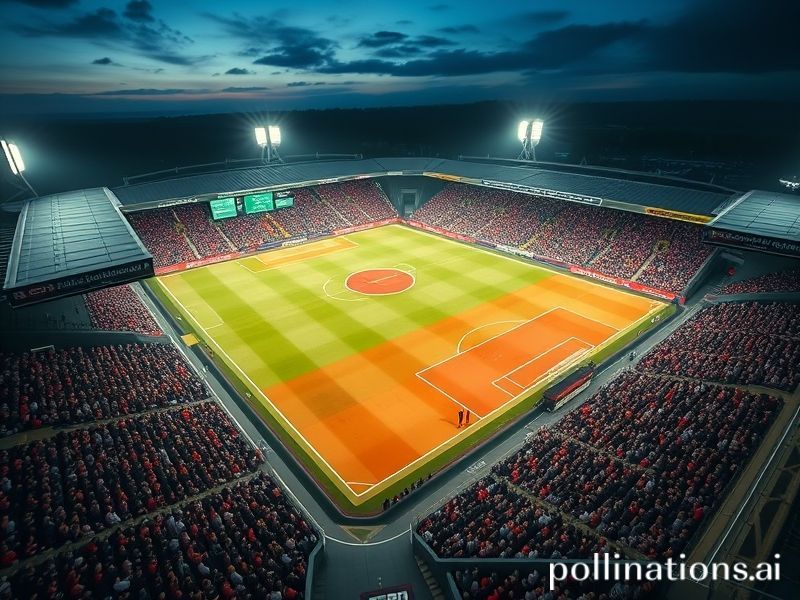Brentford vs Manchester United: A Century-Old Grudge Match Rebooted for the Streaming Apocalypse
Brentford vs Manchester United: A Timeline of Hope, Hubris and the Slow Death of Geography
By Our Man in the Departure Lounge
Wednesday, 7:42 p.m. GMT. A Boeing 777 banks over Hounslow, passengers half-watch an in-flight map that still shows the Soviet Union, and somewhere below, Brentford’s new stadium flickers like a pop-up ad for late capitalism. In 124 years the club has changed postal codes more often than most people change PIN numbers, but tonight the world is invited—via eight sanctioned streaming services and three VPN work-arounds—to witness the latest installment of Brentford versus Manchester United.
1896 – The first recorded meeting, when both teams still believed trains were bleeding-edge and the sun would never set on the empire that exported both football and opium. Brentford, a works team for the local water company, wins 2-1. Somewhere in Kolkata a telegram boy misprints the score and sparks a week-long market rally in jute futures. Colonialism, like a bad loan, always comes due with interest.
1938 – An FA Cup tie coincides with Neville Chamberlain waving a piece of paper he definitely hadn’t read. Brentford lose 3-1 but the gate receipts finance new floodlights. Historians still debate which investment aged worse.
1975 – United arrive as European champions; Brentford languish in the Third Division, a status as relevant to global finance as a drachma. Yet 40,000 cram into a ground that would now violate several fire codes and at least two human-rights charters. The game ends 2-2, proving that hope can be monetized long before crypto.
1992 – The Premier League launches, branding itself “A Whole New Ball Game.” Brentford are not invited, confirming the universe’s preference for oligarchs over beekeepers. United become a satellite channel with a football problem, floating on the NYSE in 2012. Somewhere an algorithm notices that Brentford’s postcode (TW8) and United’s market cap ($4.3 billion) share the same numerals. The algorithm is immediately hired by a hedge fund.
2014 – A League Cup collision. United field a midfield so undercooked it could sue for defamation; Brentford equalize in stoppage time and win on penalties. The Economist runs a chart correlating the result with declining sales of Manchester-themed merchandise in Southeast Asia. No one in Myanmar notices.
2021 – The COVID season. Brentford, freshly promoted via a playoff final that felt suspiciously like a live-streamed hostage video, host United on the opening weekend. Inside 35 minutes the score is 4-0 to Brentford, prompting global WhatsApp groups to fracture along class lines. In Lagos, a betting shop erupts; in Palo Alto, a venture capitalist googles “Where is Brentford?” and accidentally buys a fintech startup instead.
2022 – United return with a new manager, the human equivalent of a LinkedIn motivational quote. Brentford win 4-0 again, this time confirming that history doesn’t repeat itself—it simply clears its throat and asks for a larger television contract. The match trends worldwide, sandwiched between grainy footage of Kyiv and an influencer’s oat-milk meltdown. Somewhere a UN intern drafts a resolution condemning the offside rule.
2023 – A drab 1-0 to United, notable only for the referee checking VAR longer than most marriages last. Viewing figures in Jakarta eclipse those in Manchester, proving that English rain is now a global export, like guilt.
2024 – The next fixture looms. Brentford sit mid-table, financially solvent thanks to a “Moneyball but with more existential dread” recruitment model. United hover around sixth, the international sweet spot for maximum noodle-sponsor exposure. Ticket prices have risen faster than Arctic sea levels; the stadium announcer now reads disclaimers in four languages and one hedge-fund dialect.
Conclusion
From Thameside mud to Qatari satellites, the Brentford-Manchester United timeline charts nothing less than the evolution of sport into a leveraged buy-out of childhood memories. Each meeting is a reminder that geography can be deleted by broadcast rights, yet 90 minutes still contain enough chaos to make a mockery of algorithms, oligarchs and your carefully curated fantasy-league team. Somewhere in the metaverse, a non-fungible George Best is still trying to nutmeg a digital bee, and the crowd—half bots, half insomniacs—clicks like.
As the 777 descends toward Heathrow, the in-flight map refreshes, and for a moment the old borders flicker back into view. Then the screen buffers, the pixels rearrange, and Brentford versus Manchester United is rebroadcast in 37 languages. The game, like the planet, keeps spinning long after the lights go out—mostly because someone somewhere has worked out how to charge extra for darkness.







